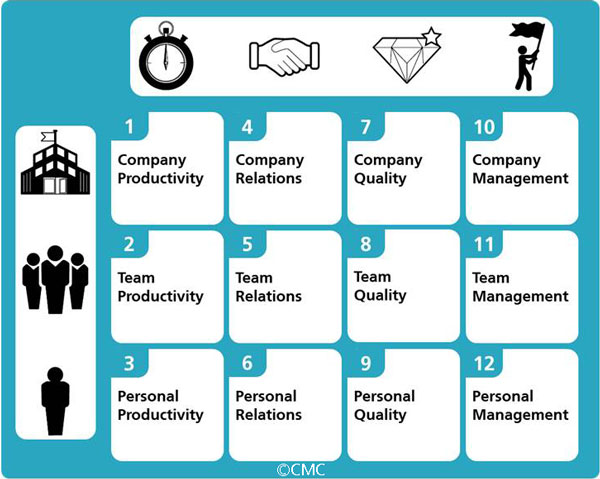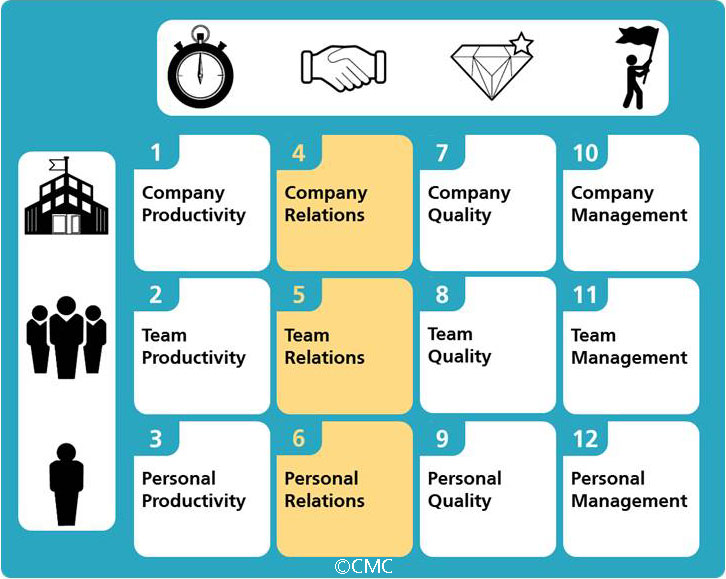Emotional Business Excellence (EBE)

RELATIONSHIPS is not a management fad but an evergreen concept essential for the survival and growth of any business.
Relationships means building and maintaining good relations with all stakeholders – the ones who can “make you or break you”.
RELATIONSHIPS is about:
- “Putting People First” – before systems, machines and technology
- attracting the best people, recruiting the right ones, retaining them and inspiring them to perform at their best
- establishing and practicing values and principles that will promote responsibility, loyalty, initiative, team spirit and positive energy
- creating a company culture characterised by openness, honesty and mutual trust
- establishing and maintaining good relationships between:
- Management and staff
- Team members in each team
- All teams in the organisation
- attracting and retaining the right investors and suppliers
Claus Møller’s Relationship Management Concept may be seen as an umbrella comprising other relationship related concepts like:
- Emotional and Social Intelligence
- Emotional Capital
- Stakeholder Relationship Management
- Team Building
- EI Leadership
- Conflict Solving
Excellent relations imply high productivity and high quality – and vice versa
Bad relationships impede productivity
People and teams who do not function well together will spend too much of their time and energy on non-productive activities.
Bad relationships impede quality
People and teams who do not function well together make more mistakes – and tend to focus more on own problems than on meeting customer expectations.
Excellent relationships are easier to establish and maintain if people who work together produce good results together. Achieving goals together in an efficient way tends to promote job satisfaction and team spirit.
Excellent relationships are easier to establish and maintain if people strive for quality. Quality work leads to recognition and job satisfaction and promotes loyalty, commitment, pride and other positive emotions.
The Relationship Process

The 3 relationship windows in the General Business Excellence model (4, 5 and 6) represent the Relationship Behaviour that any company needs to exercise to ensure that all internal and external stakeholders (”the ones who can make you or break you”) work for you and not against you.
When relationship behaviour is exercised at all three levels and everyone contributes to better interpersonal and team relations, the company has established a Relationship Process. This process is one of the four vital business processes to be established and maintained in any business.
The Relationship Process functions when:
- all individuals and teams are using and developing their emotional and social capacity to establish good relations with all relevant people and groups inside and outside the company
- everyone strives to create and maintain a team and company culture that provides the best conditions for people to function well together and bring out their best
Claus Møller calls the relationship process SHAPING the CULTURE.
The role of emotions in relationships
The biggest problems people are faced with – at home and at work – are emotional rather than factual.
People are divorced because they cannot manage their emotions.
People quit their job for emotional reasons:
- they don’t like their boss
- they don’t feel appreciated
Companies lose customers for emotional reasons.
Customers leave because:
- they are dissatisfied with the attitude displayed by the staff
- they do not like the way their complaints were handled
Companies hire the wrong people because they focus more on professional than emotional and social skills.
Most employees do not bring out their best for emotional reasons:
- they fear management
- they feel lonely and isolated
- they feel stressed and exhausted
Employees resist change for emotional reasons:
- they feel uncertain about their future
- they don’t trust management
- they feel uncomfortable with change
- they are not flexible in their thinking
Teams and individuals fight internal “wars” because:
- they cannot manage their emotions
- they lack empathic skills
- they lack team skills and group orientation
Mergers fail for emotional rather than factual reasons:
- too little attention is paid to the reactions from the people involved
- only products, systems, facilities, policies, strategies are “merged”-
The result is often loss of key employees and customers and lower bottom line results
Companies suffer big losses or die because they focus on bottom line results and forget the Human Factor and the emotions of those who create the results.
TQM, BPR, CRM and other change processes fail because too little attention is paid to the emotions of the employees – the Human Factor.
In order for companies to grow and survive, they have to manage their own emotions and their relationships with all their stakeholders.
Individuals, teams and entire organisations have to be emotionally smart – they have to create, monitor and maintain Emotional Business Excellence.
Emotional Intelligence Model
Claus Møller has developed a unique model for creating Emotional Intelligence (EI). The EI model can help individuals, teams and organizations enhance their competence within 5 areas and 15 components of Emotional Intelligence.
What individuals gain from enhancing their Personal EI
More success at work and in their private lives by:
- Better understanding their strengths and weaknesses
- Making their emotions work for and not against them
- Solving everyday problems effectively
- Motivating themselves and reaching their goals
- Recognising and understanding the emotions of others
- Building and maintaining good relations
- Creating higher self-esteem
What teams gain from enhancing Team EI
Better team results by:
- Better understanding the team’s strengths and weaknesses
- Making the team’s emotions work for and not against the team
- Effectively solving everyday problems
- Motivating all team members and reaching the team goals
- Recognising and understanding the emotions of the team’s stakeholders
- Building and maintaining good relations with the team’s stakeholders
- Creating a better team spirit
What organisations gain from enhancing Organisational EI
Improved bottom line results through:
- Better understanding of the organisation’s strengths and weaknesses
- Identifying the emotional undercurrents in the organisation
- Making the emotions and moods prevailing internally work for and not against the organisation
- Recognising and understanding the emotions of the organisation’s stakeholders
- Building and maintaining good relations with the organisation’s stakeholders
- Improving company culture
Claus Møller is many times awarded management consultant of numerous organizations – IBM, American Express, the European Commission, IKEA, McDonald’s, Shell, Audi/Volkswagen … – and the author of several best-selling books and articles from the areas of management, communications, productivity and human behaviour.

